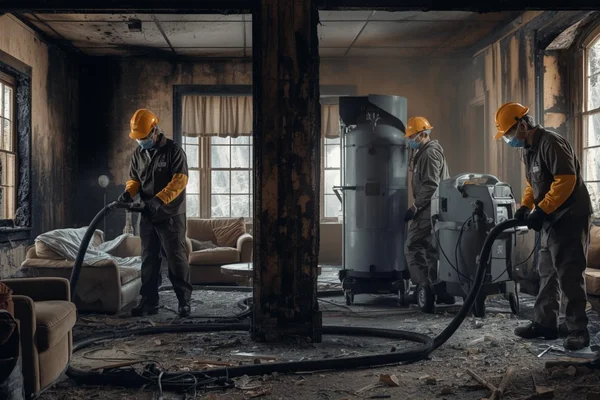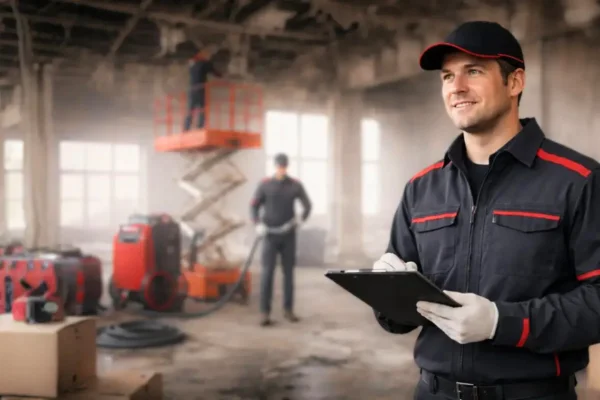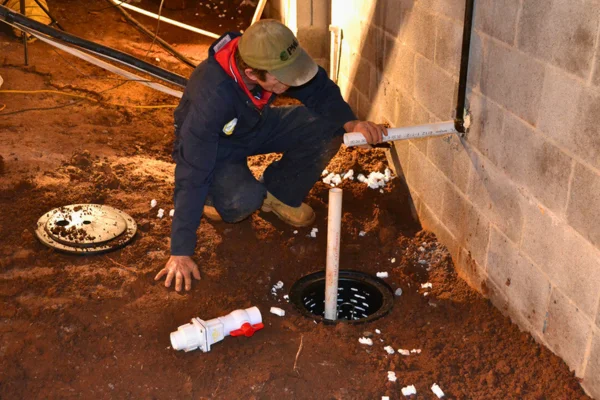If you’ve discovered your water heater leaking, it’s a warning you shouldn’t overlook. Even a minor leak can signal an underlying issue that may worsen over time. Understanding what these signs mean can help you act before severe damage occurs.
Common water heater issues can disrupt daily routines. Learn why water heaters leak and explore effective methods for fixing water heater issues. In this guide, we’ll explore the most important indicators to watch for and why they matter. Let’s take a closer look now at leaking water heater repair services and considerations!
Why You Shouldn’t Ignore a Leaking Water Heater
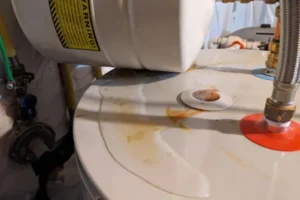
Ignoring a leaking water heater can lead to severe damage to your home and property. It increases the risk of a complete water heater failure, which can leave you without hot water and result in higher energy costs. Addressing the issue promptly can save you from costly repairs and future inconveniences.
Potential Damage to Your Home and Property
A leaking water heater can cause severe home damage if left unattended. Water may seep into floors, walls, and foundations, leading to mold and structural issues. Prompt action can prevent costly repairs.
Regular water heater leak detection helps spot problems early. If issues persist, professional leaking water heater repair ensures safety, efficiency, and long-term protection for your home. From water heater issues to understanding why water heaters leak, our tips help you diagnose and fix water heater problems quickly.
Risk of Water Heater Failure and Increased Energy Costs
A leaking water heater can overwork, resulting in higher energy costs and utility bills. Continuous leakage causes corrosion and buildup, shortening the heater’s lifespan. Left unchecked, it may fail completely, requiring expensive replacement.
Immediate repair prevents inconvenience and unexpected expenses. Addressing leaks promptly keeps your home safe, efficient, and protected from avoidable damage and unnecessary costs.
Signs Your Water Heater Is Leaking
Spotting water around your heater? Address water heater issues promptly. Discover why water heaters leak and find practical solutions for fixing water heater issues efficiently. Timely water leak detection can prevent costly damage. Learn the key signs your water heater may be leaking—and what to do next.
Visible Water Pooling Around the Base
Water pooling around your heater’s base signals a leak from a crack, corrosion, or a faulty valve. Turn off the water supply, investigate the source, and act quickly to prevent costly home damage.
Rusty or Corroded Parts on the Heater
Rust or corrosion on the tank or fittings weakens your water heater, increasing the risk of leaks. Regular inspection and maintenance help catch problems early, ensuring your system stays safe, efficient, and long-lasting.
Unusual Noises Coming from the Water Heater
Banging, popping, or hissing sounds often indicate sediment buildup or pressure issues that can lead to leaks. Addressing these noises promptly prevents damage, reduces repair costs, and ensures your water heater continues to function safely.
Lower Water Pressure or Lukewarm Water
Leaks can disrupt the flow of hot water, resulting in lower pressure or inconsistent temperatures. Check for puddles, drips, or corrosion, and address any issues promptly to maintain efficiency and prevent costly water heater repair due to leaks.
Increased Utility Bills
A leaking water heater works harder, driving up energy use and costs. Investigate for visible leaks, damp spots, or inconsistent hot water supply to prevent further damage and unnecessary expense.
Common Causes of Water Heater Leaks
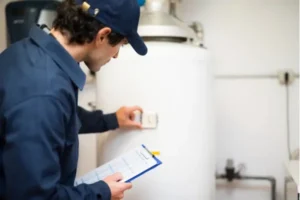
Water heater leaks can stem from several common issues that you should be aware of. You might find that a worn-out drain valve, sediment buildup, or corroded components are often to blame. By identifying the root cause early, you can prevent more extensive damage and costly repairs.
Worn-Out Drain Valve
A worn drain valve can loosen or corrode, allowing leaks to occur near the water heater’s base. Inspect regularly for rust or poor sealing. Replacing a faulty valve promptly prevents water damage and avoids unnecessary repair costs.
Sediment Buildup in the Tank
Mineral deposits at the tank’s bottom reduce efficiency, cause overheating, and may lead to cracks or leaks. Flushing the tank regularly removes sediment, maintaining performance and preventing costly damage to your water heater.
Corroded Tank or Pipes
Metal tanks and pipes can rust over time, creating leaks and discoloring water. Regular inspections help detect corrosion early. Replacing affected components ensures safe operation and avoids extensive water damage in your home.
Damaged Temperature and Pressure Relief Valve
A faulty temperature and pressure relief valve may leak or signal unsafe pressure buildup. Inspect for corrosion or wear, and replace immediately if damaged to prevent safety risks and protect your water heater.
Cracks in the Tank
Cracks in tanks can occur due to wear, corrosion, or improper installation, leading to persistent leaks. Inspect closely for fissures or rust. In most cases, replacing the tank is the most effective long-term solution to prevent further damage.
How to Handle a Water Heater Leak
Dealing with a water heater leak requires quick action to prevent water damage, safety hazards, and costly repairs. Following a transparent process helps contain the problem and restore your system’s function. Here’s a step-by-step guide on how to effectively fix a leaking water heater.
Turn Off the Power and Water Supply
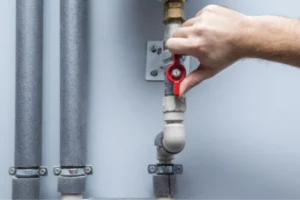
Immediately shut off the power and water supply to prevent hazards and flooding. For electric units, switch off the circuit breaker; for gas, close the gas valve. Turn the cold water valve clockwise to stop the water flow, reducing potential damage and ensuring safety before proceeding with further inspection.
Inspect the Leak and Assess the Severity
Check around the heater for drips, puddles, or visible damage. Inspect valves, connections, and the tank surface for cracks or corrosion. Listen for hissing, which may indicate pressure issues. Determine if it’s a minor drip or steady flow to decide urgency and necessary repair steps.
Temporary Solutions vs. Permanent Fixes
Minor leaks may be slowed using plumber’s tape or patch kits, offering short-term relief. However, permanent repairs require fixing the underlying cause, such as replacing damaged valves or corroded parts. Opting for a permanent fix prevents recurring leaks, protecting your water heater and reducing future expenses.
Contact a Professional Plumber for Repairs
Hiring a licensed plumber ensures accurate diagnosis and safe repairs. They can identify whether the issue stems from corrosion, faulty valves, or loose fittings. Professionals have the right tools, knowledge, and preventive advice to restore your water heater’s efficiency and prevent future leaks effectively.
When Should You Replace Your Water Heater?
Knowing when to replace your water heater can save you time and money. Let’s explore what you need to know to make the best decision for your home.
Signs That It’s Time for a New Water Heater
Knowing when to replace your water heater helps you avoid sudden breakdowns and costly water damage. Watch for these warning signs:
- Age of Unit – Most water heaters last 8–12 years; older units are more prone to failure.
- Inconsistent Temperatures – Fluctuating hot water or running out too soon signals efficiency issues.
- Rust or Corrosion – Visible rust on the tank or pipes indicates structural deterioration.
- Unusual Noises – Popping or rumbling often indicate sediment buildup, which can affect performance.
- Water Pooling – Leaks or puddles around the unit can lead to severe home damage.
Factors to Consider Before Replacing Your Water Heater
Replacing a water heater is an important investment. Here are key factors to guide your decision:
- Unit Age – If your heater is 8–12 years old, it’s near the end of its lifespan.
- Energy Efficiency – Older models often consume more energy, raising utility costs.
- Repair Frequency – Frequent breakdowns suggest replacing the unit may be more cost-effective.
- Household Demand – Growing families or increased hot water usage may require a larger capacity.
- Budget and Incentives – Consider costs, warranties, and rebates for newer, efficient models.
Final Thoughts on Dealing With Water Heater Leaks

Never overlook the warning signs of a water heater leaking. Pooling water, rust, inconsistent temperatures, or strange noises all indicate potential problems that require immediate attention. Acting quickly can prevent extensive damage, costly repairs, and inconvenient disruptions to your hot water supply.
Regular inspections and maintenance not only help detect issues early but also extend the lifespan of your unit. By staying alert and addressing problems promptly, you can ensure that your water heater operates efficiently and reliably, providing consistent comfort for your household. A proactive approach today can save you time, money, and stress in the long run.
Water heater issues are common in many homes. We are here to help you learn why water heaters leak and get expert help in fixing water heater issues. Need Help Fixing Your Leaking Water Heater? Our Experts Are Ready to Help.


